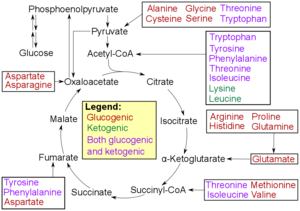
A ketogenic amino acid is an amino acid that can be degraded directly into acetyl-CoA, which is the precursor of ketone bodies and myelin, particularly during early childhood, when the developing brain requires high rates of myelin synthesis.[1] This is in contrast to the glucogenic amino acids, which are converted into glucose. Ketogenic amino acids are unable to be converted to glucose as both carbon atoms in the ketone body are ultimately degraded to carbon dioxide in the citric acid cycle.
In humans, two amino acids – leucine and lysine – are exclusively ketogenic. Five more are amphibolic (both ketogenic and glucogenic): phenylalanine, isoleucine, threonine, tryptophan and tyrosine. The remaining thirteen are exclusively glucogenic.[2]
YouTube Encyclopedic
-
1/3Views:28 0124 112298 085
-
Introduction to glucogenic and ketogenic amino acids
-
Amino Acid Oxidation Pathways (Part 2 of 10) - Glucogenic vs Ketogenic Amino Acids
-
Overview of Amino Acid Metabolism
Transcription
Studies
Ketogenic amino acids serve important roles in the human body, leading to the study of ketogenic amino acid rich (KAAR) diets as possible treatment for non-alcoholic fatty liver disease (NAFLD) and diabetes.[3] Dietary studies of fatty liver disease in mice show that decreasing the intake of ketogenic amino acids lysine and threonine may induce hepatic steatosis, a major cause of non-alcoholic fatty liver disease.[4] Leucine in particular has been shown to serve an important role in the metabolic pathway for insulin via activation of the rapamycin complex 1 (mTORC1) and protein S6 kinase 1 (S6K1) for which over-activation leads to insulin resistance.[5] Further studies illustrate that ketogenic amino acid rich diets may aid in decreasing obesity and insulin resistance, but their usage remains disputed.[3] Ketone bodies, specifically β-hydroxybutyrate (βHB) whose levels are increased while on a ketogenic diet, aid in the renewal of myelin for demyelinated axons. This renewal of myelin is important for individuals with multiple sclerosis (MS). MS is a condition which the immune system will attack the myelin sheath that insulates the nerves. Ketogenic diets are being explored as a possible remedy for this condition as the ketone bodies aid in the regeneration of myelin.[6] Ketogenic diets are shown to alleviate diffuse axonal injury (DAI). This was tested using rats being fed a standard diet in comparison to rats being fed a ketogenic diet post DAI. Rats that were fed a standard diet showed a progressive degradation of myelin, on day 14 post DAI it was evident that myelin sheaths have collapsed, dissolved or disappeared from the injured axons. For the axons with remaining myelin, the myelin was becoming thinner. Rats that were served ketogenic diets presented axons with thicker myelin in comparison to the standard diet rats. The marker that was used to determine axonal injury in this study was amyloid precursor protein (APP). Rats that were fed a standard diet and an uptake of APP, leading to an increase in damaged/injured axons.[7]
See also
References
- ^ Yudkoff, Marc; Daikhin, Yevgeny; Melø, Torun Margareta; Nissim, Ilana; Sonnewald, Ursula; Nissim, Itzhak (2007). "The Ketogenic Diet and Brain Metabolism of Amino Acids: Relationship to the Anticonvulsant Effect". Annual Review of Nutrition. 27: 415–430. doi:10.1146/annurev.nutr.27.061406.093722. ISSN 0199-9885. PMC 4237068. PMID 17444813.
- ^ Berg J, Tymoczko J, Stryer L (2015-04-08). "Protein Turnover and Amino Acid Catabolism". Biochemistry (8th ed.). Macmillan Learning. ISBN 978-1-4641-2610-9. Archived from the original on 2007-06-30.
- ^ a b Noguchi Y, Nishikata N, Shikata N, Kimura Y, Aleman JO, Young JD, Koyama N, Kelleher JK, Takahashi M, Stephanopoulos G (August 2010). "Ketogenic essential amino acids modulate lipid synthetic pathways and prevent hepatic steatosis in mice". PLOS ONE. 5 (8): e12057. Bibcode:2010PLoSO...512057N. doi:10.1371/journal.pone.0012057. PMC 2919399. PMID 20706589.
- ^ Singal SA, Hazan SJ, Sydenstricker VP, Littlejohn JM (February 1953). "The production of fatty livers in rats on threonine-and lysine-deficient diets". The Journal of Biological Chemistry. 200 (2): 867–74. doi:10.1016/S0021-9258(18)71436-1. PMID 13034849.
- ^ Hinault C, Mothe-Satney I, Gautier N, Lawrence JC, Van Obberghen E (December 2004). "Amino acids and leucine allow insulin activation of the PKB/mTOR pathway in normal adipocytes treated with wortmannin and in adipocytes from db/db mice". FASEB Journal. 18 (15): 1894–6. doi:10.1096/fj.03-1409fje. PMID 15479767. S2CID 45289168.
- ^ Bahr, Lina Samira; Bock, Markus; Liebscher, Daniela; Bellmann-Strobl, Judith; Franz, Liane; Prüß, Alexandra; Schumann, Dania; Piper, Sophie K.; Kessler, Christian S.; Steckhan, Nico; Michalsen, Andreas; Paul, Friedemann; Mähler, Anja (December 2020). "Ketogenic diet and fasting diet as Nutritional Approaches in Multiple Sclerosis (NAMS): protocol of a randomized controlled study". Trials. 21 (1): 3. doi:10.1186/s13063-019-3928-9. ISSN 1745-6215. PMC 6941322. PMID 31898518.
- ^ Mu, Jiao; Wang, Tingting; Li, Meiyu; Guan, Teng; Guo, Ying; Zhang, Xiaoli; Zhang, Guohui; Kong, Jiming (2022-07-03). "Ketogenic diet protects myelin and axons in diffuse axonal injury". Nutritional Neuroscience. 25 (7): 1534–1547. doi:10.1080/1028415X.2021.1875300. ISSN 1028-415X. PMID 33487123. S2CID 231703455.
External links
- Amino acid metabolism
- Amino acid metabolism
 Media related to Ketogenic amino acids at Wikimedia Commons
Media related to Ketogenic amino acids at Wikimedia Commons

